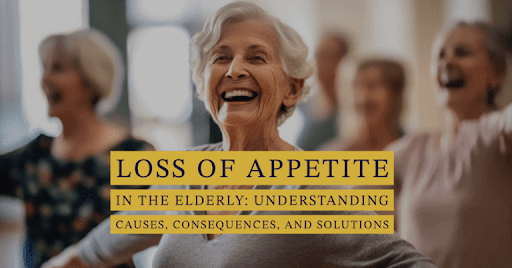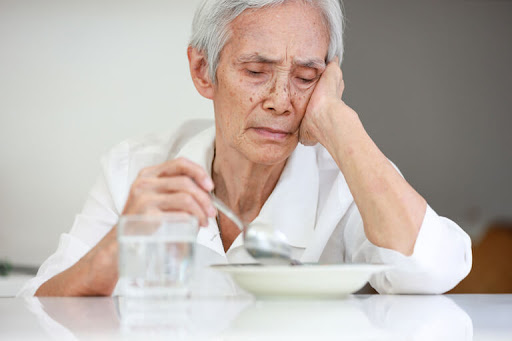Loss of Appetite in the Elderly: Understanding Causes, Consequences, and Solutions
As individuals age, they may experience various changes in their physical and mental health, including a common issue known as “loss of appetite” or “lack of appetite.”
Loss of appetite in the elderly can lead to poor nutrition, unintentional weight loss, and a decline in overall health.
In this blog post, we will delve into the causes and consequences of this condition, its impact on the quality of life in seniors, and practical strategies to address and manage it.
Additionally, we will explore how finger foods can be helpful and ways to ensure nutrition despite a decreased appetite. Let’s shed light on this significant aspect of elderly health.

Understanding Loss of Appetite in the Elderly
Loss of appetite is shown by a reduced desire or interest in eating, leading to a decreased food intake.
It is a common issue in older people, often caused by various physiological and psychological factors.
Some common reasons for loss of appetite in the elderly include:
Changes in Metabolic Rate
As individuals age, their metabolic rate tends to decrease, which results in a reduced need for calories. This change can lead to a decreased appetite as seniors feel less hungry.
Medication Side Effects
Some medications prescribed to older adults may cause loss of appetite as a side effect. These medications can include certain pain relievers, antidepressants, and drugs for managing chronic conditions.

Medical Conditions
Health conditions, such as thyroid disorders, digestive disorders, dental problems, or chronic illnesses, can affect seniors’ appetite and eating patterns.
Changes in Taste and Smell
As individuals age, they may experience a decline in taste and smell sensitivity, making food less appealing.
The Consequences of Loss of Appetite in the Elderly
Unintentional Weight Loss
A lack of appetite can lead to unintentional weight loss, a concerning issue for older adults, as it can weaken their immune system and increase the risk of complications.
Nutritional Deficiencies
Insufficient food intake can result in nutritional deficiencies, leading to inadequate intake of essential vitamins and minerals.

Impact on Quality of Life
Poor appetite can negatively impact the overall quality of life for seniors, affecting their energy levels, mood, and ability to engage in daily activities.
The Importance of Adequate Nutrition in the Elderly
Maintaining Physical Health
Adequate nutrition is vital for maintaining physical health and preventing nutritional deficiencies and related health problems. A balanced diet can support immune function, promote bone health, and maintain muscle strength, reducing the risk of falls and fractures.
Supporting Cognitive Function
Proper nutrition is essential for maintaining cognitive function and reducing the risk of cognitive decline in the elderly. Nutrients like omega-3 fatty acids, antioxidants, and B vitamins play crucial roles in brain health and memory function.
Enhancing Immune Function
A well-balanced diet can strengthen the immune system, helping seniors to resist infections and illnesses better. Adequate protein intake is especially crucial for supporting immune function and tissue repair.

Promoting Healing and Recovery
Proper nutrition is vital for seniors recovering from illness, surgery, or injury. A well-nourished body can heal more effectively and experience a faster recovery process.
Strategies to Address and Manage Loss of Appetite in the Elderly
Finger Foods for Seniors
Finger foods can be a practical solution for seniors experiencing a loss of appetite. These foods are easy to handle and require minimal effort, making them more appealing to individuals with reduced appetite.

Some examples of finger foods include:
- Sliced fruits and vegetables: Providing nutrient-rich fruits and vegetables in easy-to-handle slices or sticks can encourage seniors to snack and eat more throughout the day.
- Cheese cubes or sticks: Cheese is a good source of protein and calcium, and its soft texture makes it an ideal finger food option for seniors.
- Bite-sized sandwiches or wraps: Miniature sandwiches or wraps filled with protein-rich ingredients and vegetables can be a tasty and convenient option for seniors.
- Nuts and seeds: Offering a variety of nuts and seeds can provide essential nutrients and healthy fats to support overall health.
- Miniature muffins or quiches: Preparing small-sized muffins or quiches with a mix of vegetables and protein can be an enjoyable and nutritious snack or meal option.
Offering a variety of finger foods can make mealtimes more enjoyable and encourage seniors to eat more frequently throughout the day.
Small and Frequent Meals
Instead of large, overwhelming meals, offering smaller, more frequent meals can be less intimidating and more manageable for seniors with poor appetites. This approach ensures a steady intake of nutrients throughout the day, preventing long periods of fasting and promoting better digestion.
Nutrition-Rich Foods
Including nutrient-dense foods can give seniors essential vitamins and minerals despite their reduced food intake.

Nutrient-dense options include:
- Lean proteins like fish, poultry, and legumes: Proteins are essential for muscle health, immune function, and tissue repair. Incorporating lean sources of protein can ensure seniors receive adequate protein intake.
- Whole grains, like quinoa and brown rice: Whole grains are rich in fiber, which aids in digestion and helps regulate blood sugar levels. Providing whole-grain options can contribute to better digestive health.
- Dairy or dairy alternatives providing calcium and vitamin D: These nutrients are crucial for bone health and reducing the risk of osteoporosis. Seniors can benefit from fortified dairy alternatives if they have lactose intolerance.
- Colorful fruits and vegetables for antioxidants and fiber: Fruits and vegetables provide essential vitamins, minerals, and antioxidants that support overall health. Encouraging a variety of colorful produce can add interest to meals.
Hydration
Ensuring seniors stay adequately hydrated is crucial for overall health and can also help stimulate appetite. Dehydration can lead to feelings of weakness, fatigue, and reduced appetite. Encourage regular sips of water and offer hydrating foods like watermelon, cucumber, or soup.
Avoiding Empty Calories
Minimizing empty-calorie foods, such as sugary snacks and beverages, is essential. These items may further reduce appetite and provide little nutritional value. Instead, focus on nutrient-dense options that provide the necessary vitamins and minerals for overall health.
Encouraging Social Meals
Eating in the company of others can enhance the dining experience and encourage seniors to eat more. Social interactions during meals can improve mood and create a positive eating environment. Family members, friends, or fellow residents in assisted living facilities can participate in shared meals to promote a sense of connection and enjoyment during mealtimes

Consultation with Healthcare Professionals
If an elderly individual experiences persistent or severe loss of appetite, it’s crucial to consult with healthcare professionals. They can assess the underlying causes, conduct necessary tests, and provide personalized solutions to manage the condition effectively.
A medical professional can also help rule out any severe underlying conditions affecting appetite.
Conclusion
Older people’s appetite loss is a common issue that can significantly affect their health and overall well-being. Understanding the causes and consequences of poor appetite in seniors is essential for addressing this concern and promoting adequate nutrition.
By incorporating strategies like finger foods, smaller meals, and nutrient-rich options, we can help seniors maintain their health and quality of life, ensuring they receive the nourishment they need to thrive in their golden years.
Encouraging open communication, regular health check-ups, and support from healthcare professionals can all contribute to managing loss of appetite in the elderly and enhancing our beloved seniors’ overall health and happiness.
Our responsibility is to ensure seniors receive the care, attention, and proper nutrition they deserve to lead fulfilling and healthy lives.
FAQs (Frequently Asked Questions) about Loss of Appetite in the Elderly

What are the common causes of loss of appetite in older people?
Loss of appetite in the elderly can be caused by various factors, including changes in metabolic rate, medication side effects, medical conditions, and changes in taste and smell. It is essential to identify the underlying cause to address the issue effectively.
How does loss of appetite affect the quality of life in seniors?
Poor appetite can lead to unintentional weight loss, nutritional deficiencies, and a decline in energy levels, all of which can significantly impact the quality of life in seniors. It may result in reduced enjoyment of meals and a decreased desire to engage in social activities.
What are some practical strategies to encourage seniors to eat despite losing their appetite?
Finger foods can be beneficial, as they are easy to handle and require minimal effort. Offering smaller, more frequent meals can be less overwhelming, and including nutrient-dense foods can ensure seniors receive essential vitamins and minerals.
How can caregivers and family members support seniors with poor appetite?
Caregivers and family members can be crucial in supporting seniors with poor appetite. They can encourage social meals, create a pleasant and comfortable dining environment, and involve seniors in the meal preparation and menu planning to increase their interest in eating.
When should I seek professional help for an older person experiencing loss of appetite?
If an elderly individual’s loss of appetite persists or is accompanied by other concerning symptoms, it is essential to seek professional help. Consulting a healthcare provider can help identify potential underlying medical conditions or medication side effects affecting appetite.
Can loss of appetite be a sign of a more serious health issue?
Yes, loss of appetite can sometimes be a symptom of an underlying medical condition, such as gastrointestinal disorders, depression, or other health issues. It is essential to seek medical advice to rule out any serious health concerns.
How can I ensure adequate nutrition for an elderly person with a diminished appetite?
Ensuring adequate nutrition for seniors with a diminished appetite involves offering nutrient-dense foods, providing hydration, and incorporating supplements if necessary. Regular check-ins with healthcare professionals can help monitor seniors’ nutritional status and adjust their diet accordingly.
Can finger foods be suitable for seniors with dental problems?
Yes, finger foods can be a practical option for seniors with dental problems, as they require less chewing and are easier to manage. Soft finger foods like yogurt, cooked vegetables, and soft fruits can be included in their diet.
Can loss of appetite in seniors be reversed?
In some cases, loss of appetite in seniors can be addressed and managed through various strategies, such as providing a supportive eating environment, offering finger foods, and addressing any underlying medical issues. However, it is essential to consult with a healthcare professional to identify the best approach based on the individual’s situation.
Are there any specific vitamins or supplements that can help improve appetite in seniors?
Certain vitamins, such as vitamin B12, and minerals, like zinc, can play a role in maintaining a healthy appetite. However, consulting with a healthcare professional before starting any supplements is essential, as individual needs may vary.
Remember, loss of appetite in the elderly should not be ignored, as it can have severe consequences for their health and well-being. If you have concerns about a senior’s appetite or nutritional intake, seek professional advice to ensure they receive the necessary support and care.


